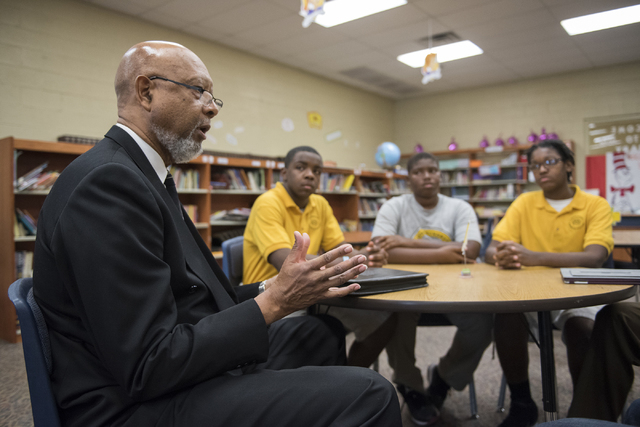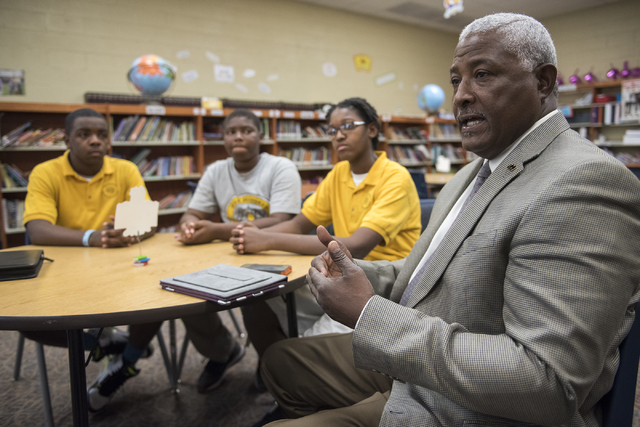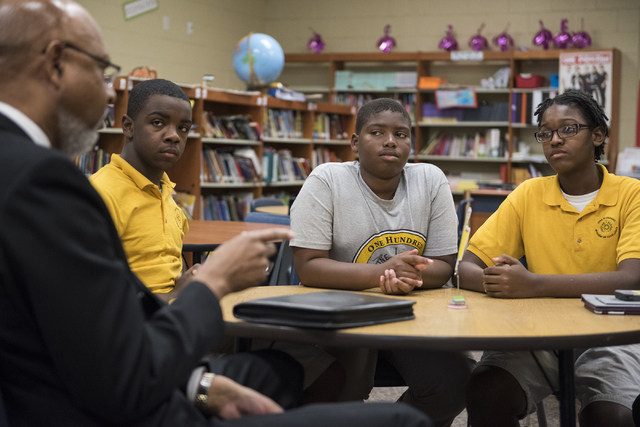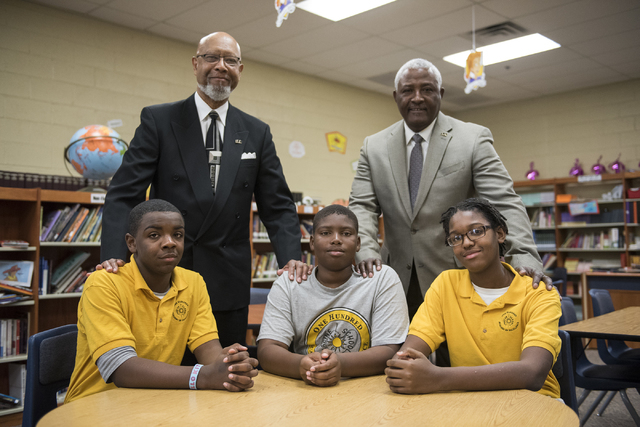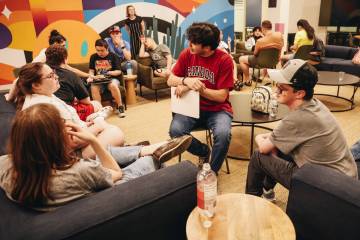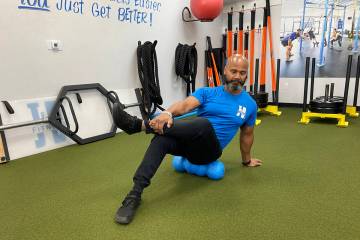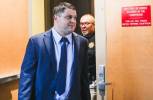Mentors help youths see brighter future
Before coming to the organization 100 Black Men, many of the youngsters in the group’s mentoring program defined themselves as troublemakers on constant trips to the principal’s office and incurring the wrath of disciplinarians — parents and teachers alike.
But a tide came into their lives ushering change.
“I am not who I used to be,” says Tre’Jon Hawkins, a 13-year-old student who has been in the program several years.
With the help of mentors in the community, students like Hawkins have been able to change their outlook and behavior.
Sitting across from three young men in the 100 Academy of Excellence, Joe Jones, president of the Las Vegas Chapter of 100 Black Men, impeccably dressed in his black suit, is there to make a difference in the youths’ lives.
And part of that starts with the suit.
“All of our mentors come suited and booted,” Jones says. “We have a motto: What they see is what they’ll be.”
The mentors believe the same thing of every person who enters the organization: They can be anything. And they are in it for the long haul, trying to help the youth believe the same thing.
“We believe in a cradle to college approach,” says Leroy Wordlaw, vice president of external affairs for Las Vegas 100 Black Men.
The concept of 100 Black Men isn’t a recent one.
In 1963, prominent leaders in the black community, such as baseball legend Jackie Robinson, came together to start a program that would improve the quality of life for black youths.
“They wanted to find a way to make an impact,” Jones says. “They wanted to find a way to change the outcome of these men.”
The 100 Black Men of America was born.
Today, there are more than 103 chapters around the country and even international affiliations.
The Las Vegas chapter opened shop in 2000 focusing on mentorship, education, economic development, and health and wellness.
“But 100 Black Men takes pride in its mentoring program,” Jones says.
Guiding the youths are professionals ranging from doctors and lawyers to entertainers in the community.
“We give them something to look toward to help them grow,” he adds.
The chapter is highly selective of mentors who come into the program.
Throughout the week, the organization offers mentoring at various locations including Wendell P. Williams, Mackey and Kelly elementary schools along with the Pearson Community Center.
Mentoring also takes place at the 100 Academy of Excellence, a charter school established by 100 Black Men that opened in 2006.
More than 100 students enroll in the local programs each year.
Throughout the week, 100 Black Men provides mentoring in various ways including through sports programs — baseball, soccer, golf — and chess.
But Jones and Wordlaw say mentoring goes beyond just the days of the week they have designated offerings and just at school.
“It takes a village to change the outcome of these students,” Wordlaw says.
Jones says the success of the program can be seen and measured by the students who improve grades, receive fewer disciplinary actions at school, develop a better relationship with teachers and parents, and have a significant change in behavior and attitude.
Hawkins, who came to the mentoring program when he was in second grade, has experienced a change in his life.
Despite having relatively good grades in elementary school, he admits he had a lot of behavioral problems.
“I was probably sent to the dean’s office every day,” he says
After starting with 100 Black Men, he began to improve.
Unlike past authority figures who would just punish Hawkins when he did something wrong, he says his mentor would reward him whenever he did something right.
From the beginning, mentors worked to change the path Hawkins was on.
In second grade, right before he started attending programs with 100 Black Men, he had so many discipline actions at his school he says his teacher considered holding him back.
“But my mentor stepped in and made a deal,” Hawkins says. “He promised the teacher if she could see improvement in my behavior immediately to reconsider.”
Hawkins says one of the mentors worked with him, encouraging him to do better.
His attitude has improved and so have his grades.
Mentorship didn’t just help adjust his behavioral problems. It also helped changed his outlook on life.
“I used to want to be a cop,” Hawkins says. “I thought that was the best outcome I could be. Now, I want to be a neurosurgeon.”
Like Hawkins, 11-year-old Sir Mells and 14-year-old Kevin Carroll transformed their lives.
Mells started 100 Black Men in the fourth grade.
Similarly to Hawkins, he was a frequent visitor of the dean’s office at school.
“I was kind of a troublemaker,” he says. “I would always be talking back to teachers.”
But that was until he started attending mentoring sessions.
“I think I’m a better man because of them,” Mells says.
The program also helps the young men with self-confidence.
Carroll says without the organization he honestly thinks he would be nothing.
“But they show you who you can be,” he says. “They put you on the path to greatness and give you the confidence to feel like you can be more.”
Carroll, too, wants to go to college and eventually become a neurosurgeon like Hawkins.
Many of the mentors know the cyclical nature of their work.
Wordlaw was once mentored himself.
Raised in a single-parent home, Wordlaw’s mother placed him in Boy Scouts where his mentor named Mr. Powell soon began working in his life.
“He took me camping, which I have never done before,” Wordlaw says. “He also took me fishing, which I had never done before.”
But more importantly, he gave Wordlaw advice that would shape his path for years to come. When he was 17 and dropped out of high school, it was his mentor who encouraged him to look at other possibilities.
Wordlaw eventually joined the army and served in Vietnam during the war.
That’s where he was able to use a lot of the life lessons he learned from Mr. Powell to help other men in his squadron.
Like Wordlaw, all these boys plan to come back and mentor one day.
“I think it’s important to come back and help develop others,” Hawkins says.
Currently, the program goes up to middle school. Jones says they would love to expand into high school with the idea of developing a college-preparedness program to help students have access to higher education.
Even though the organization doesn’t have a specific program, it already is helping members obtain scholarships for college.
Contact reporter Michael Lyle at mlyle@reviewjournal.com or 702-387-5201. Follow @mjlyle on Twitter.




